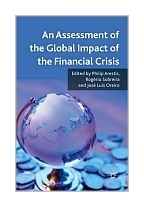|
||
• wydawnictwa polskie
• Zamów informacje o nowościach z wybranego tematu • kontakt
• Cookies na stronie |
AN ASSESSMENT OF THE GLOBAL IMPACT OF THE FINANCIAL CRISISARESTIS P. SOBREIRA R. OREIRO J.L EDITORSwydawnictwo: PALGRAVE MACMILLAN , rok wydania 2011, wydanie Icena netto: net price + 5% vat. The 2008 financial crisis hit the heart of capitalism, but the effects were much weaker in the 'periphery' of the capitalist system than in its center. This book provides a solution to this paradox. The analysis presented here shows that current account surpluses and
accumulation of foreign reserves are important for developing countries because they allow
them to conduct anti-cyclical policies in the face of a financial crisis in developed
countries. Stabilization of output is important for robust growth in the long term due to
its effects over capitalist animal spirits. Developed countries should never pursue a
growth strategy based merely on accumulation of 'foreign savings'. It is shown that the impact of this crisis is far from being homogenous across
the developed and developing world. The most intriguing aspect of it is the fact that it
affected less those economies responsible for the generation of the 'global savings glut',
and more those economies that are more dependent on foreign capital inflows. In this
aspect, the book also addresses the question of why this crisis has been rather limited in
magnitude and of such relatively short duration. It is also shown that financial
liberalization alone cannot fully explain the crisis. It is necessary to take a good
look on the size of the financial sector all over the world and the redistributive impact
related to it. Thus, one of the main lessons that can be learned by this volume is a
profound need to implement policies that can guarantee financial stability. PHILIP ARESTIS Cambridge Centre for Economics and Public Policy,
Department of Land Economy, University of Cambridge, UK; Professor of Economics,
Department of Applied Economics V, Universidad del País Vasco, Spain; Distinguished
Adjunct Professor of Economics, Department of Economics, University of Utah, US; Senior
Scholar, Levy Economics Institute, New York, US; Visiting Professor, Leeds Business
School, University of Leeds, UK; Professorial Research Associate, Department of Finance
and Management Studies, School of Oriental and African Studies (SOAS), University of
London, UK; and current holder of the British Hispanic Foundation 'Queen Victoria Eugenia'
British Hispanic Chair of Doctoral Studies. He is Chief Academic Adviser to the UK
Government Economic Service (GES) on Professional Developments in Economics. He has
published as sole author or editor, as well as co-author and co-editor, a number of books,
contributed in the form of invited chapters to numerous books, produced research reports
for research institutes, and has published widely in academic journals. Contents Introduction 288 pages, Hardcover Księgarnia nie działa. Nie odpowiadamy na pytania i nie realizujemy zamówien. Do odwolania !. |


